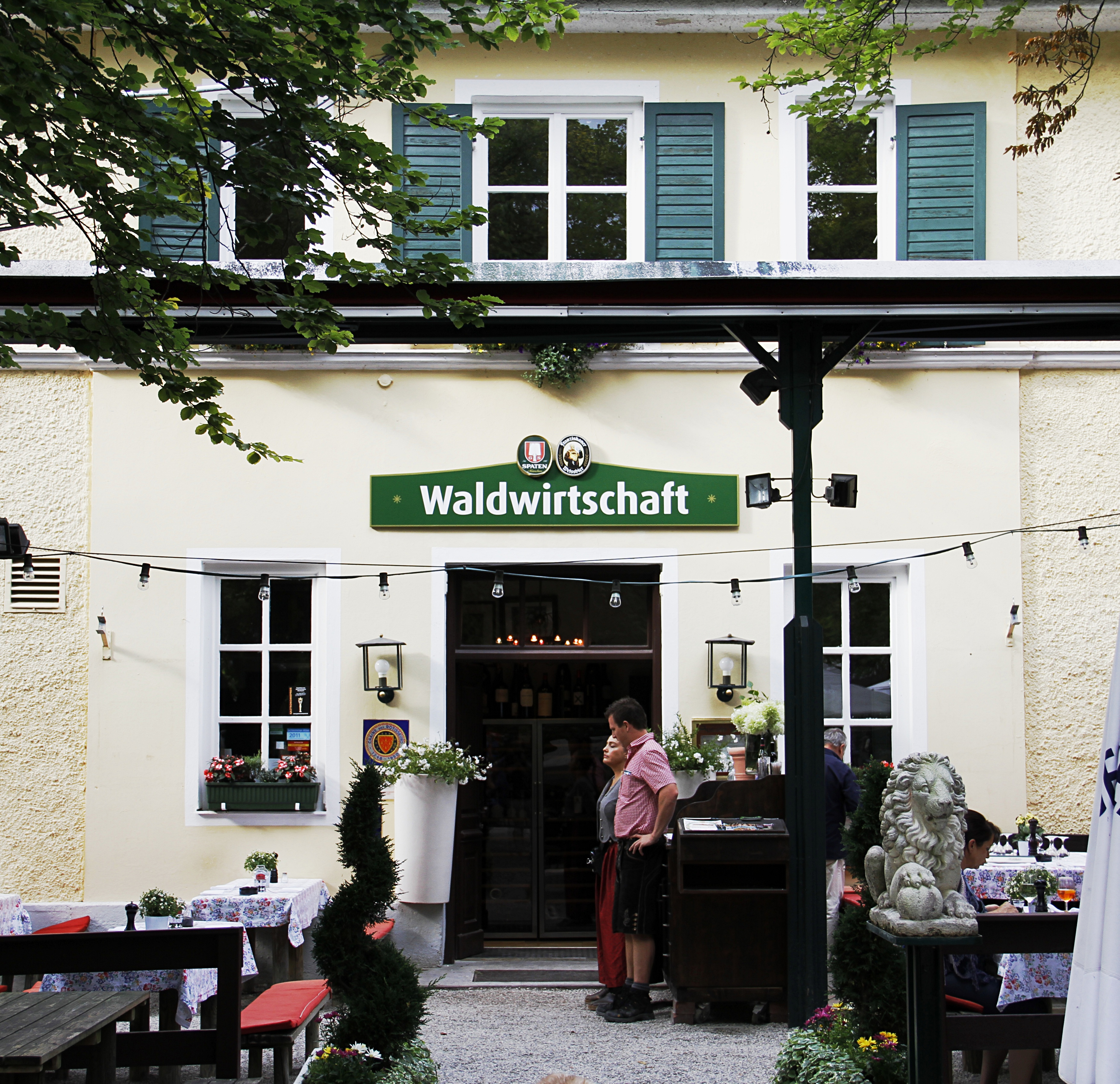Waldwirtschaft on:
[Wikipedia]
[Google]
[Amazon]
 The Waldwirtschaft is a tavern with a large
The Waldwirtschaft is a tavern with a large
beer garden
A beer garden (German: ''Biergarten'') is an outdoor area in which beer and food are served, typically at shared tables shaded by trees.
Beer gardens originated in Bavaria, of which Munich is the capital city, in the 19th century, and remain co ...
just south of Munich
Munich ( ; german: München ; bar, Minga ) is the capital and most populous city of the German state of Bavaria. With a population of 1,558,395 inhabitants as of 31 July 2020, it is the third-largest city in Germany, after Berlin and Ha ...
. It is situated in the municipality of Pullach
Pullach, officially Pullach i. Isartal, is a municipality in the district of Munich in Bavaria in Germany. It lies on the Isar Valley Railway and is served by the S 7 line of the Munich S-Bahn, at the Großhesselohe Isartalbahnhof, Pullach and ...
in the ward of Großhesselohe on the high bank (fluvial terrace
Fluvial terraces are elongated terraces that flank the sides of floodplains and fluvial valleys all over the world. They consist of a relatively level strip of land, called a "tread", separated from either an adjacent floodplain, other fluvial t ...
) of the Isar. Sepp Krätz has been the publican since 1981, and has run the Hippodrome Festival Tent at the Oktoberfest
The Oktoberfest (; bar, Wiesn, Oktobafest) is the world's largest Volksfest, featuring a beer festival and a travelling carnival. It is held annually in Munich, Bavaria, Germany. It is a 16- to 18-day folk festival running from mid- or ...
from 1995 to 2014.
The tavern is a two-winged hip roof
A hip roof, hip-roof or hipped roof, is a type of roof where all sides slope downwards to the walls, usually with a fairly gentle slope (although a tented roof by definition is a hipped roof with steeply pitched slopes rising to a peak). Thus, ...
building dating from the middle of the 19th century and is a listed building together with the neighbouring Chapel of the Holy Trinity.
History
The earliest mention of the property dates back to 776 and a dairy in the possession ofTassilo III, Duke of Bavaria
Tassilo III ( 741 – c. 796) was the duke of Bavaria from 748 to 788, the last of the house of the Agilolfings. The Son of Duke Odilo of Bavaria and Hitrud, the Daughter of Charles Martell.
Tassilo, then still a child, began his rule as a Fran ...
, which, together with the hamlet of Baierbrunn, was gifted to the Schäftlarn Abbey
Schäftlarn Abbey (Kloster Schäftlarn) is a Benedictine monastery on the Isar in Schäftlarn, south of Munich in Bavaria, Germany.
History
The monastery was founded in 762 by Waltrich, a priest of noble family, on his own land. The monaster ...
in the hope that his soul might find everlasting peace. Two hundred years later the dairy left church ownership and, in 1301, the Duke's steward, Konrad von Baierbrunn, sold the property, described as "woodland with dairy", to the Holy Spirit Hospital of Munich. The Hospital made use of the dairy and other farms to provision the poor of the city. After a fire, the Order of the Holy Spirit pulled out of Munich and the Hospital, together with its farms, fell into the ownership of the City of Munich. The brewery tavern was given a public license in the 15th century.
In 1782 Hesselohe was described as a hamlet of "a few houses... with a hermitage and a little church" and the same article suggested that the area was popular with the inhabitants of Munich. It is thought that one or more hermits had moved into the general area of the dairy, and the citizens of the city would seek these out to ask for prayers on their behalf. These visitors most likely also made use of the tavern at the dairy. The popularity of the area may well have grown as a result of the annual celebration to commemorate the founding of the church. This celebration was held amongst the trees alongside the Isar during Whitsun
Whitsun (also Whitsunday or Whit Sunday) is the name used in Britain, and other countries among Anglicans and Methodists, for the Christian High Holy Day of Pentecost. It is the seventh Sunday after Easter, which commemorates the descent of the ...
from the 18th century.
From 1779 an annual fair would take place at the dairy to coincide with the religious celebration. This fair is most likely to have been brought into existence as a result of the financial difficulties in which the Holy Spirit Hospital had found itself. The Hospital had already sought permission from Charles Theodore, Elector of Bavaria to hold a festival on June 29 to celebrate the Feast of Saints Peter and Paul
The Feast of Saints Peter and Paul or Solemnity of Saints Peter and Paul is a liturgical feast in honor, of the martyrdom in Rome of the apostles Saint Peter and Saint Paul, which is observed on 29 June. The celebration is of ancient Christ ...
. The dairy fell into difficulties during the Napoleonic Wars
The Napoleonic Wars (1803–1815) were a series of major global conflicts pitting the French Empire and its allies, led by Napoleon I, against a fluctuating array of European states formed into various coalitions. It produced a period of Fren ...
when the tenants became bankrupt. The City agreed to an auction in order to achieve some liquidity. A café owner from Munich, Paul Schröfl, became the new owner. He built a dance pavilion amongst the trees which became popular with the young people of Munich. Around this were built a number of lodges for closed communities, particularly groups of artists from Munich.
References
{{coord, 48.0667, N, 11.5394, E, source:wikidata, display=title Beer gardens in Germany